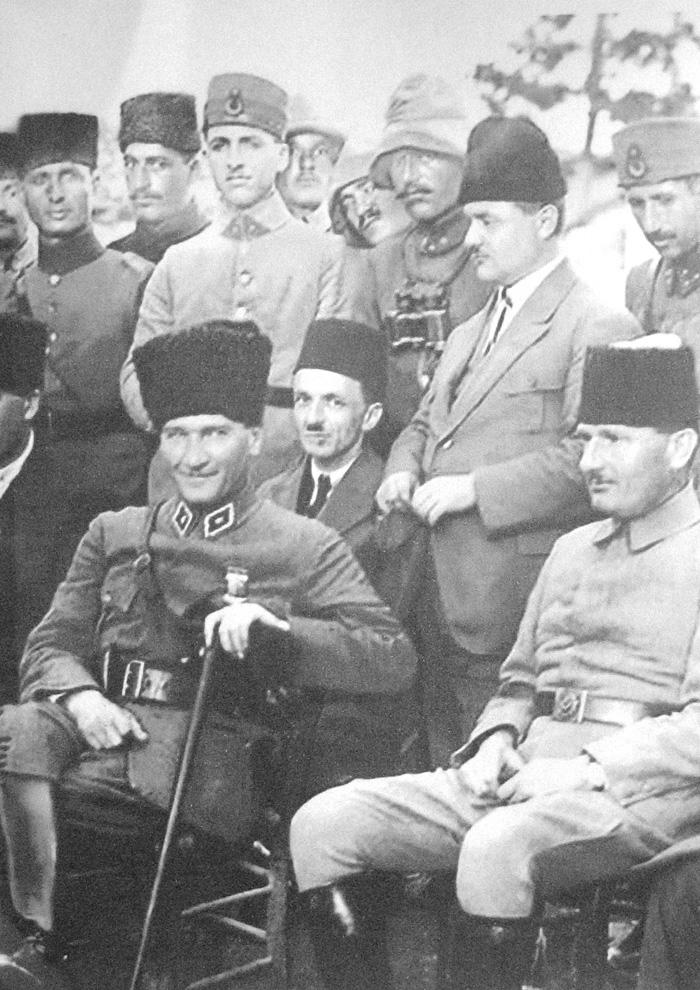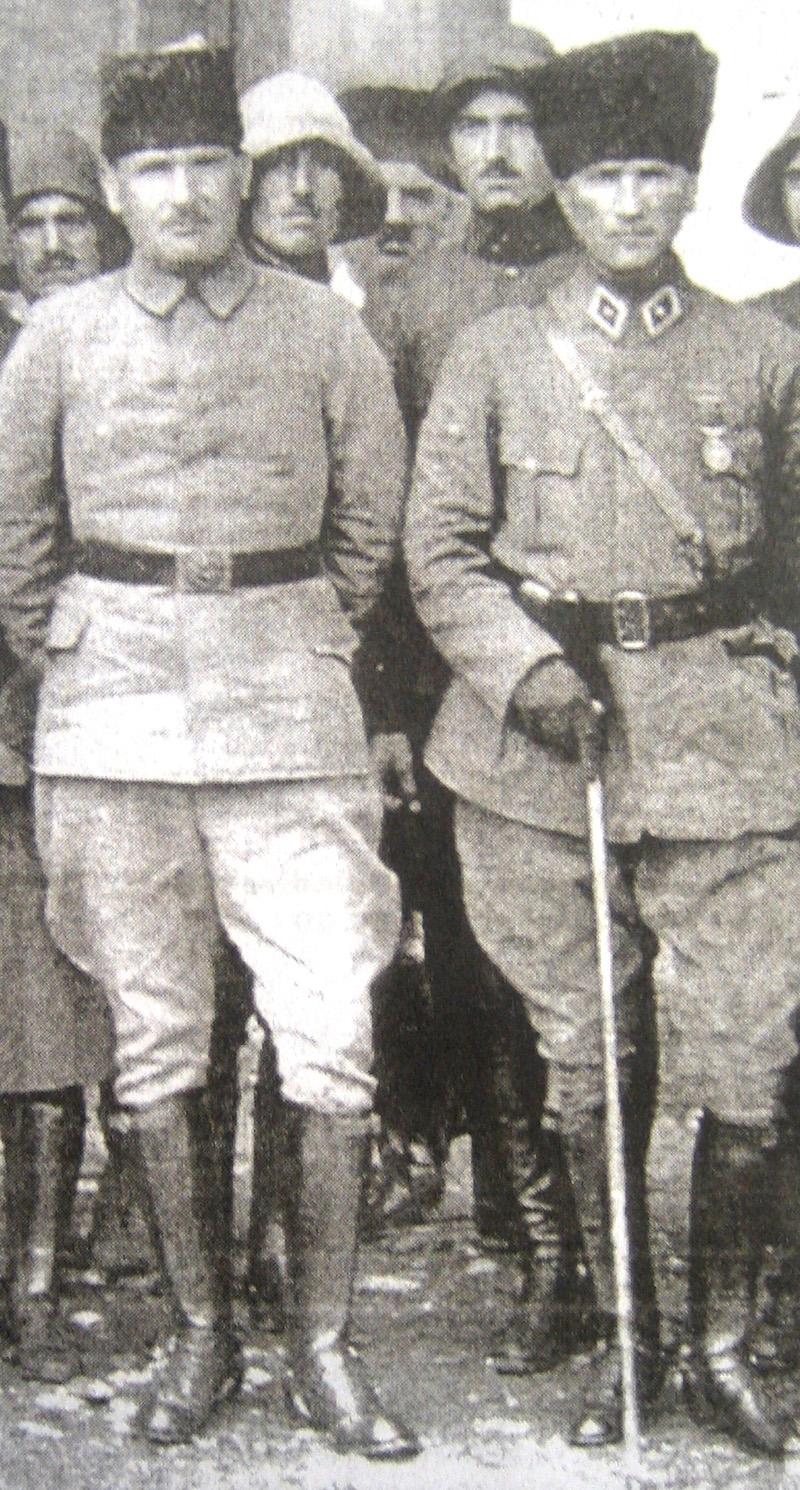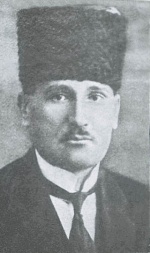.jpg)
ECHOES OF GUNFIRE IN PARLIAMENT
Recently, a quiet and unremarked piece of news was published in the newspapers. The military would be withdrawn from the parliament. Of course, what was meant was that the security of the parliament would no longer be provided by soldiers but by special units. Upon reading this news, my mind went back in time. In the 1925 parliament, the majority of MPs were soldiers. Even most of the civilians carried guns on their belts. The president and prime minister had not yet retired from the military. Some MPs who relied on their closeness to the top, such as Kel (bald) Ali Çetinkaya and his group—Rauf, Kılıç Ali, Avni, and Salih Beys—were known as the “Five Gunmen.” Yet, it was forbidden to enter the chamber armed.

A Mysterious Gun Fired…
Halid Pasha was the son of a Circassian officer. He fought in Yemen, Tripolitania, the Caucasus, and the Sakarya front. He liberated Kars, Ardahan, Erzurum, and Erzincan. He was wounded nine times. Because of his daring nature, he earned the nickname “Deli” (Crazy). Due to moving from front to front, he never married. He adopted three children who had lost their families in Dersim. He was abstemious. At his death, 19 liras and 35 kuruş (piastres) were found in his pocket.
On February 9, a dispute arose between Ardahan MP Deli Halid Pasha and Afyon MP Kel Ali’s group about the signing of a bill concerning disabled veterans, which turned into a fight. Thinking that Kel Ali’s group had set a trap for him, Pasha fired at Kel Ali. However, despite being a sharpshooter, he missed because Kel Ali had tumbled down the stairs. Then he charged at him. In the meantime, a mysterious gun fired at Halid Pasha. He was badly wounded under his left chest and carried into a room in the parliament. Mustafa Kemal Atatürk came to him and asked, “Did Ali Bey shoot you?” He replied, “No. Kel was under me, how could he shoot me? Rauf (Benli) shot me from behind.”
Halid Pasha was not taken to the hospital and remained in that room for five days. Until the well-known surgeon Orhan Tahsin Bey arrived from Istanbul, his wound worsened. During this time, his statement was prevented from being taken, and he died as a result. He passed away on the night of February 14. The matter was treated as a police incident and referred to the judiciary. The prosecution concluded that Halid Pasha had been shot by Kel Ali and ruled it was an act of self-defense. The case was closed.
Pasha was not someone to hold back his words. Indeed, he had previously spoken out about the corruption at İş Bankası and had complained about Celal Bayar and Kel Ali to the president. The president, alarmed, wanted to send Halid Pasha, whom he admired for his courage, abroad for rest, claiming he was suffering from nervous stress. In response, Pasha decided to join the newly formed opposition party, the Progressive Republican Party (Terakkiperver Parti).

.jpg)

Who Shot the Pasha?
Those who knew the truth believed that Rize MP Rauf had shot the Pasha to save his friend Kel Ali, but because MPs do not have immunity in cases of being caught red-handed, Kel Ali took the blame so he could benefit from the self-defense claim. However, many believed that everything had been orchestrated to eliminate Halid Pasha, who had made many enemies due to his outspoken nature; that he had been provoked deliberately; that the issue stemmed from the conflict between supporters of İsmet (İnönü) and Fethi (Okyar); and that the government had used Kel Ali’s group to carry it out. Halid Pasha’s mother and brother wanted to pursue the matter but were persuaded to give it up.
Halid Pasha was buried in the cemetery above his mansion in Eyüp. 15–20 years later, the cemetery was removed and houses were built in its place. The Pasha was then reinterred in the Edirnekapı Martyrs’ Cemetery. Although he died before the Surname Law, his headstone reads “Halid Karsıalan.” Interestingly, Rauf Bey was found dead in his bed just a few months later.
Memory of the Guard Officer
Hüseyin Hilmi Işık, one of the scholars and thinkers of the recent
era, recounts:
“I am from Eyüp. At the top of our
slope was the house of the famous Deli Halid Pasha. My father went out for an
Eid visit; the disabled veterans he met there asked the Pasha to help increase
their pensions. It was 1932. I was a liaison officer lieutenant at the
military medical school. Each class had one class officer. One of them was
Captain Daim Bey. He later enrolled in dental school. He resigned and became a
civilian, opening a practice in Ankara. The liaison officers had a large
office on the second floor. One day, Daim Bey came into the office. It was
crowded. He told us an incident:
‘I was a first lieutenant in the Çankaya Guard Regiment. The
Commander of the Guard Regiment, Colonel İsmail Hakkı (Tekçe), called
me and two others to his office and gave us an order: “Tomorrow there
will be a budget debate in the parliament. You will stand with your pistol at
your waist on one side of the rostrum.” He told my friend to stand on
the other side of the rostrum [near Rauf Bey]. Then he said to me, “If
the Minister of the Navy, İhsan Bey, takes the rostrum, you will keep your
eyes on the gallery as long as he speaks. If you receive a signal from the
gallery, you will draw your gun and shoot İhsan Bey at the rostrum.” He
told my friend, “You will shoot Halid Pasha the same
way.”
Coincidentally, İhsan Bey got sick that day and
couldn’t come to parliament. Halid Pasha took the rostrum. He was
fiercely defending the increase in disabled veterans’ pensions. His name
spoke for itself—Deli Halid. Kel Ali’s group was booing and
banging on their desks. Finally, they said, “There is no money; the
budget doesn’t allow it.”
In response, Halid Pasha said,
“In Kars, I took seventy carts of jewels from the Armenians and sent
them to Ankara. What happened to them?”
At that moment, the
signal came. My friend drew his gun and shot Halid Pasha. Halid Pasha
collapsed at the rostrum but did not die. Kel Ali came to the rostrum and
started hitting him with the butt of his own pistol. They took him away
immediately. A few days later, he passed away.’”
A brave MP who constantly voiced the corruption at İş Bankası and the Ministry of Public Works (Nafia Vekâleti), who leaned toward Fethi Bey and the Progressive Party, and who didn’t hesitate to defy the top for what he believed was right—such a figure, nicknamed “Deli” for his daring nature—was likely deemed necessary to be eliminated. This job, as was customary then, was assigned to the Guard Regiment. The guard officer shot Halid Pasha and withdrew; everyone believed Kel Ali was the real killer, and the incident was not pursued further. Rauf Bey had been in the Guard Regiment before becoming an MP and was still not far from such affairs.
Önceki Yazılar
-
“FASTING WAS MADE OBLIGATORY ALSO UPON THOSE BEFORE YOU”25.02.2026
-
WHAT WAS THE LAW OF THE OTTOMAN EMPIRE?18.02.2026
-
WOMAN IN THE EASTERN WORLD11.02.2026
-
THE OTTOMAN DYNASTY OWES ITS LIFE TO A WOMAN4.02.2026
-
THE WATER OF IMMORTALITY IN THE “LAND OF DARKNESS”28.01.2026
-
THE WORLD LEARNED WHAT FORBEARANCE IS FROM SULTAN MEHMED II21.01.2026
-
THE RUSH FOR GOLD14.01.2026
-
TRACES OF ISLAM IN CONSTANTINOPOLIS7.01.2026
-
WHO CAN FORGIVE THE KILLER?31.12.2025
-
WHEN WAS PROPHET ISA (JESUS) BORN?24.12.2025